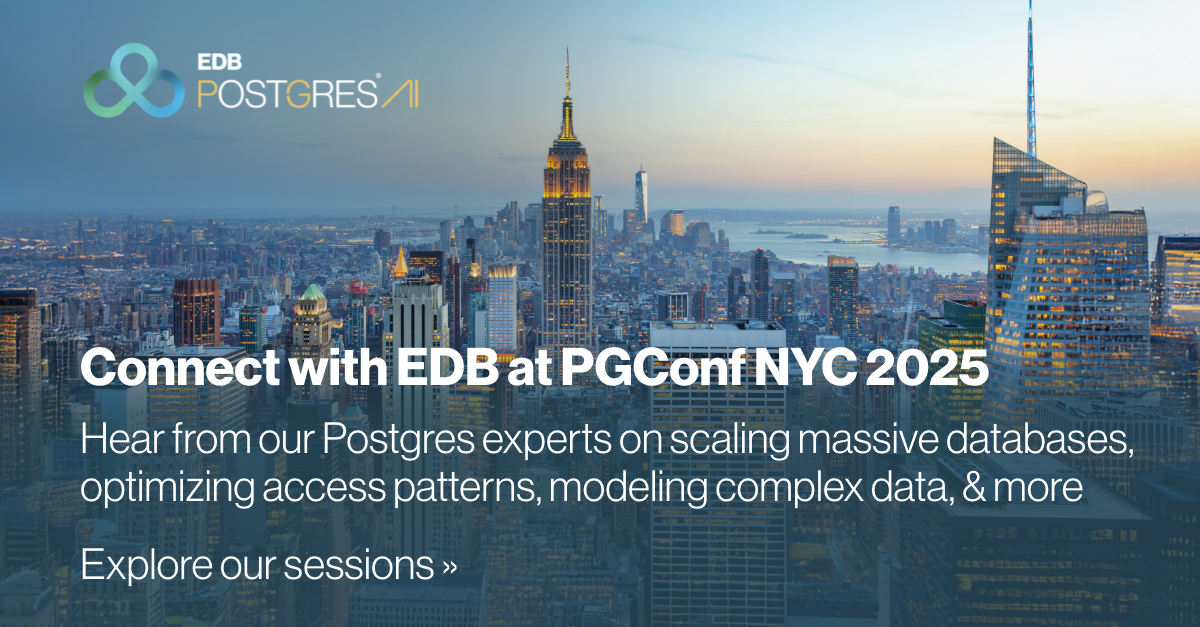PostgreSQL is at a pivotal moment: adoption has never been higher, it’s the world’s most popular database among developers, and enterprises are running it at scales once reserved for proprietary systems. At the same time, the community is preparing to release PostgreSQL 18, the latest chapter in a project that has thrived for more than three decades.
What makes Postgres unique is its balance: steady, incremental evolution that preserves trust, paired with constant innovation that keeps it relevant for modern workloads. Each new release reflects that, and so do the conversations happening inside the community.
PGConf NYC is one of those events where those conversations take shape. This year, EDB speakers will bring perspectives that mirror the themes shaping the future of PostgreSQL and the community at large: extensibility, scale, flexibility, performance, and ecosystem.
Extensibility: New possibilities with access methods
Session: Optimizing for Access Patterns: Postgres Table Access Methods and Index Access Methods
Speaker: Tom Kincaid
Every application interacts with its database differently. Some tables are written constantly but rarely read; others are heavily queried but seldom updated. Recognizing these patterns opens the door to optimization—if the database itself is extensible enough to take advantage.
Enter Table and Index Access Methods. They allow Postgres to be tuned at a deeper level, optimizing how data is stored and retrieved for specific workloads. For years, this kind of extensibility was mostly the domain of proprietary systems. In Postgres, it’s been steadily evolving, and with PostgreSQL 18, new levels of plugability in the Index Access Method API make it easier than ever for developers to innovate in this space.
In his talk, Tom will explore how TAMs and IAMs have matured, the real-world scenarios where they can deliver performance gains, and what’s possible for open source and commercial implementations. It’s both a history lesson and a look forward: showing how extensibility ensures Postgres can adapt the the application demands of today and tomorrow.
Scale: Lessons from a 200TB upgrade
Session: 200TB and Rising: A Real-World Upgrade Story from the Trenches of PostgreSQL
Speaker: Vibhor Kumar
There’s nothing theoretical about upgrading a PostgreSQL database that holds more than 200 terabytes of production data. The stakes are enormous: uptime is critical, performance cannot slip, and data integrity must be absolute. It’s the kind of challenge that separates best practices from lived experience.
In his session, Vibhor will walk through what it really takes to move a database of this scale from PostgreSQL 13 to PostgreSQL 17. He’ll share the strategies his team used to minimize downtime in a 24/7 environment, the validation steps that ensured data remained rock solid, and the hard lessons learned when performance tuning and extension compatibility came into play.
For DBAs, architects, and enterprises planning their own upgrades, this talk offers practical, battle-tested guidance. And in a moment when PostgreSQL 18 is around the corner, it’s also proof of just how far the database has come.
Flexibility: Schema modeling through the lens of… jazz?
Session: Database Modeling to Study the New York Jazz Scene
Speaker: Boriss Mejías
Not every database challenge is about scale. Sometimes it’s about creativity, like how to design schemas that can capture something as fluid and dynamic as human culture.
In this session, Boriss takes inspiration from the New York jazz scene. Using its history and ongoing vibrancy as a case study, he explores how to structure Postgres schemas that store events, relationships, and evolving data over time. Along the way, he’ll cover trade-offs in normalization, the role of data types, and how extensions can expand what’s possible.
It’s a playful example with serious implications. Postgres has always been valued for its adaptability, and schema design is where that flexibility comes alive. Whether modeling music, science, or finance, the same principles apply: build a structure that reflects reality while leaving room for growth. As Postgres adds new capabilities for extensibility and manageability, this talk is a reminder of why the database continues to resonate with developers tackling diverse and ever-changing problems.
Performance: The secret life of the Postgres optimizer
Session: Beyond joins and indexes
Speaker: Bruce Momjian
Postgres is best known for its robust query optimizer, but joins and indexes are just the beginning. In this session, Bruce takes a deep dive into the 40+ other operations the optimizer can employ—from incremental sort and memoize to parallel append, gather merge, and hash aggregate.
These aren’t edge cases. They’re the tools Postgres uses to make complex queries on large datasets both efficient and reliable. Bruce will explain the purpose of these operations, walk through example queries that trigger them, and show how they contribute to performance at scale.
For anyone who wants to understand how Postgres balances flexibility with execution speed, this session is a great peek under the hood.
Ecosystem: Why Postgres is so much more than its core
Sponsor talk: Working Across Projects in the Postgres Ecosystem
Speaker: Martín Marqués
PostgreSQL’s success depends on the rich ecosystem of tools and extensions that surround it. Features like backup management, high availability, and plugin extensibility are critical to its real-world adoption and reliability.
In his sponsor talk, Martín will show how ecosystem projects evolve in step with core Postgres. He’ll highlight how Barman’s development aligned with PostgreSQL 17’s incremental backup feature, and how that work continued with the enhanced backup-linking capabilities introduced in PostgreSQL 18.
The takeaway here: Postgres doesn’t thrive in isolation. Coordinated development across ecosystem projects strengthens it as a platform, ensuring it can meet the needs of enterprises running in Kubernetes, the cloud, or on bare metal.
Looking Ahead to PostgreSQL 18
As PostgreSQL 18 approaches, EDB is proud to stand alongside the community as its largest contributor.
In the past two releases alone, our engineers have helped deliver built-in incremental backup, faster logical replication setup, expanded JSON functionality, new index access method enablement, OAuth authentication, and a series of critical security enhancements.
These are the contributions that make Postgres trusted for mission-critical workloads, AI integration, and sovereign deployments. Our speakers’ sessions in New York are one expression of that ongoing commitment and proof that Postgres thrives when innovation, scale, and creativity all come together.
We hope to see you at PGConf NYC this year, from September 29th - October 1st, 2025 at Convene 117 West 46th Street, New York, New York. Click here to visit the event website and learn more.

